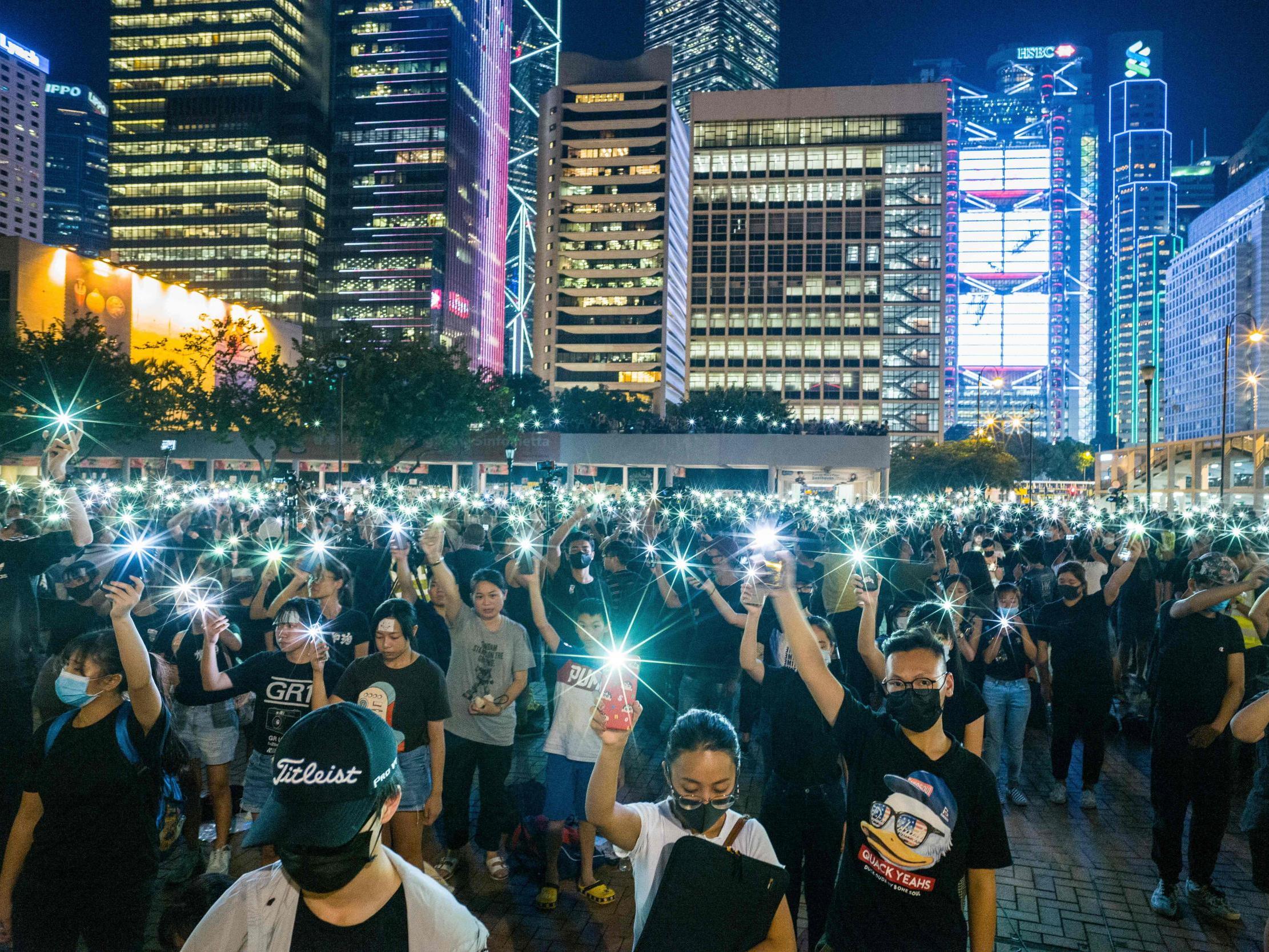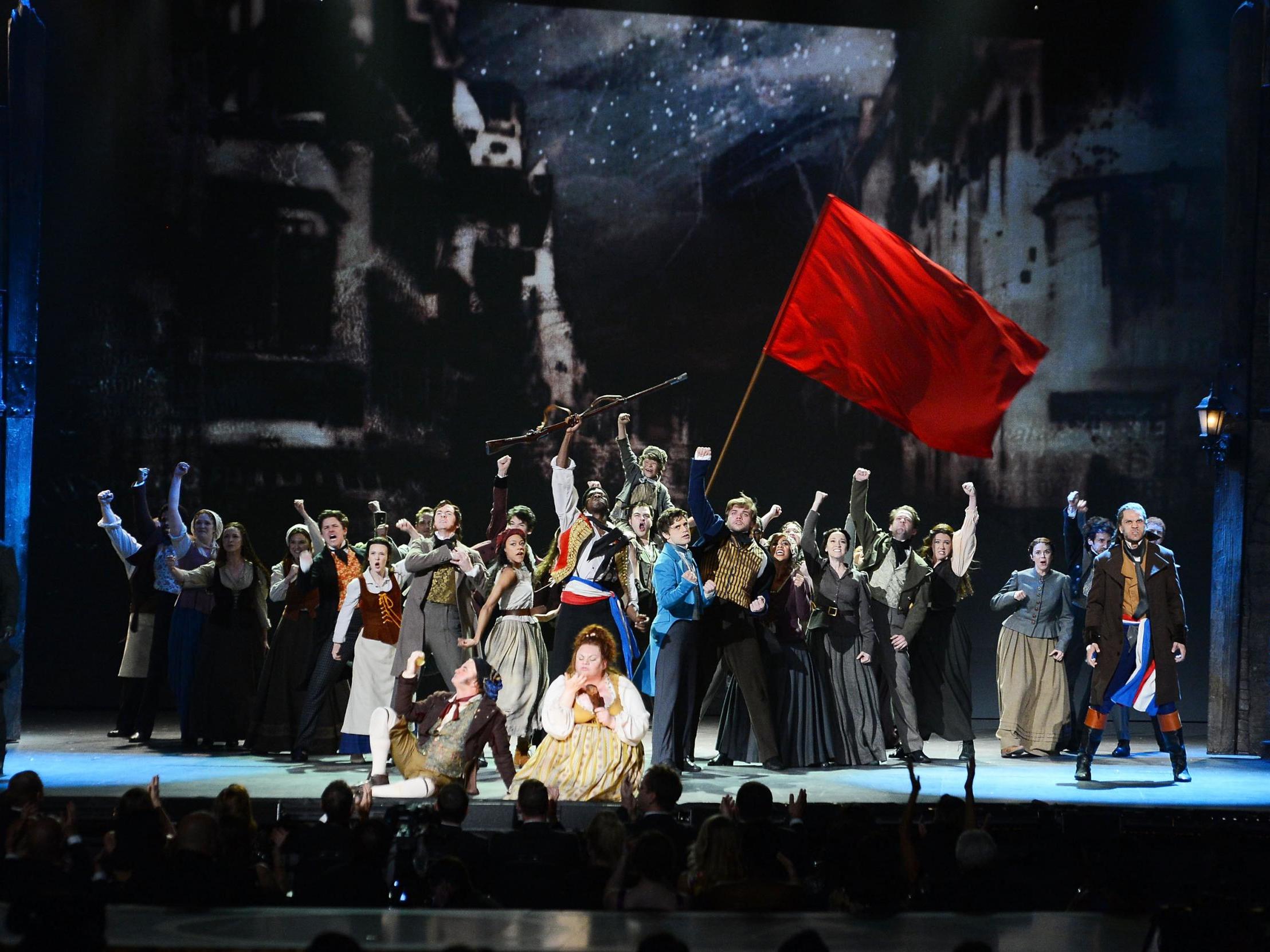The song from Les Miserables that has become a protest anthem in Hong Kong
‘Do You Hear the People Sing?’ may be about the Paris Uprising of 1832, but its inspiring sentiment has made it an emblem of hope for people fighting for their rights across the world, says Zamira Rahim

Your support helps us to tell the story
From reproductive rights to climate change to Big Tech, The Independent is on the ground when the story is developing. Whether it's investigating the financials of Elon Musk's pro-Trump PAC or producing our latest documentary, 'The A Word', which shines a light on the American women fighting for reproductive rights, we know how important it is to parse out the facts from the messaging.
At such a critical moment in US history, we need reporters on the ground. Your donation allows us to keep sending journalists to speak to both sides of the story.
The Independent is trusted by Americans across the entire political spectrum. And unlike many other quality news outlets, we choose not to lock Americans out of our reporting and analysis with paywalls. We believe quality journalism should be available to everyone, paid for by those who can afford it.
Your support makes all the difference.Try to stream the Les Miserables album in China and you’re likely to find it two songs short. “Do You Hear the People Sing?” and its reprise are missing from multiple albums on QQ Music, one of the country’s biggest streaming sites. The song, about Parisians rebelling against their venal rulers, has been scrubbed from the original London cast recording. It has also vanished from the 10th and 25th anniversary albums and from the soundtrack of the 2012 film adaptation.
Beijing’s censors are closely monitoring Hong Kong, where pro-democracy protesters began marching in June. The crowds first took to the streets in frustration over an extradition bill that, if passed, would have allowed authorities to detain and extradite individuals wanted by the mainland. Under the 1997 agreement with the UK to transfer sovereignty of the former British colony to China, the Communist government is supposed to adhere to a “one country, two systems” policy, under which Hong Kong retains a high degree of autonomy. The territory has an independent legal system and police force. But its chief executive, Carrie Lam, is pro-Beijing. The protesters, fearful for their rights, want her gone.
They have marched all summer. Many protests were peaceful, but some have turned violent and there have been allegations of police brutality. Music permeates them all; the crowds sing hymns and chants as they wield umbrellas, their symbol of protest. “Do You Hear…” can be heard in the city’s streets and along the Tsim Sha Tsui promenade. When the demonstrators seized control of Hong Kong’s airport in August it was this tune they sang, sitting cross-legged on a terminal floor.
For lovers of the musical, the tune may seem an odd choice for a protest song. On stage, “Do You Hear…” is an anthem of rage and hope. But it is also a cry from the losing side.
The stage adaptation is based on Victor Hugo’s novel, which in turn was inspired by the Paris Uprising of 1832. During the June rebellion, 3,000 protesters tried to overthrow King Louis-Philippe’s government. Initially, they seized control of the funeral cortege of a well-loved general. It is this scene, in the musical, which sees the cast rallying, booming “Do You Hear…” from all corners of the stage.
For a night, the rebels were in control of several areas of Paris, where they built barricades and shouted about supping in the Tuileries Palace. They lasted less than 48 hours, after which the National Guard moved in. Without both book and show, it’s possible they would go unremembered by anyone, bar historians.
Hugo’s book champions the ordinary people of 19th-century Paris. It examines poverty and social misery and builds to the rebellion, which serves as its climax. There are low points; before the barricades, readers have to put up with endless digressions, including several pages on Paris’s sewer system. The novel was published in 1862 and was critically panned but a commercial success, its sentimentality striking a note with the public.
The book led to the musical, which was first performed in French and staged in Paris in 1980, at the Palais des Sports. An English version followed five years later, produced by Cameron Mackintosh, who asked Herbert Kretzmer to adapt the lyrics.
“The original French lyrics for the signature song warned of the ‘will of the people’. To me, that felt like political grandstanding – so I rewrote it to link the idea of liberty and democracy with the song title itself,” Kretzmer wrote in the Daily Mail.
“But I never imagined ‘Do You Hear the People Sing?’ might become an anthem for protesters everywhere.”
“Do you hear the people sing?/Singing the song of angry men/It is the music of a people/who will not be slaves again…” Kretzmer’s lyrics listened to on their own, outside the context of the musical, make the song a natural call to arms. Its use as a protest song surged in 2013, shortly after a film adaptation of Les Miserables was released worldwide. People in Turkey sang it in June that year, during the Gezi Park protests. The same summer, marchers in Taiwan, furious over the death of a soldier, sang it too. And towards the end of the year, Ukraine’s anti-government Maidan demonstrations began. The movement’s leaders seized control of Kiev’s central square, where they built barricades and sang the song.
Shortly afterwards, pro-democracy protests broke out in Hong Kong, during a series of sit-ins sometimes known as the Umbrella Revolution. At the time, videos of protesters singing Les Miserables spread on social media. It was ideal Twitter fodder for westerners. The song is a well-known one, the tune uncomplicated – which means a reasonably competent singer can manage it. And there is a universality to Kretzmer’s lyrics, of anger at those in power.

Protest music is commonly associated with the Sixties, with Bob Dylan and the anti-Vietnam War folk scene. But contemporary protest tracks are still being made, often within hip hop and R&B. Artists, such as J Cole and Lauryn Hill, have reacted via music to the treatment of African Americans, to police brutality and the election of Donald Trump. But it’s a rare hit that tops the international charts while being explicitly political, and many singers shy away. They have to make a living and there are always fan bases and sponsorship partners and tour tickets to consider.
Musical theatre has stepped in where pop music cannot. Les Miserables is about the grinding effects of poverty, in a time so alien that its songs are not considered political. Viewers are drawn to the romances and the comedy. But the story, in both book and musical, is one of being young and likely doomed but reaching for a better world anyway. Many of Les Miserables’ characters are dead by its end, but each one returns for the finale, to reprise “Do You Hear…” It is a song that will recur, time and again, when those who govern fail the masses.
“When people ask me why the song remains so popular, I answer that I tried to tell the truth about one of the key issues of all time: injustice, which can turn men and women into slaves, cause anger and humiliation and crush the human spirit,” Kretzmer said.
“Yet it ends with the words ‘When tomorrow comes’ because I truly believe that hope can never be extinguished.”
He added: “Do you hear the people of Hong Kong? They are standing up for their rights.
“At 93, I can only be with them in spirit. But my words are on their lips – and I am singing with them, too.”
Join our commenting forum
Join thought-provoking conversations, follow other Independent readers and see their replies
0Comments